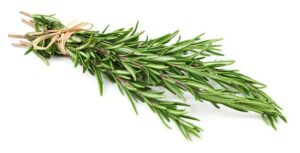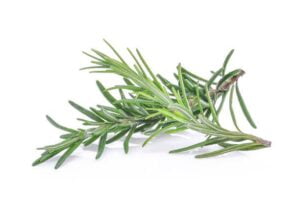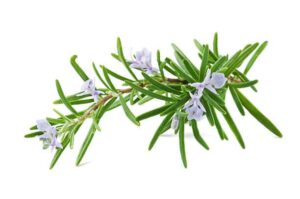
Cognitive Enhancement:
Memory Improvement:
- Rosemary Aroma: The scent of rosemary contains compounds like 1,8-cineole (also known as eucalyptol), which have been shown to enhance memory performance. According to a study in “Therapeutic Advances in Psychopharmacology” (2016), inhaling rosemary aroma led to improved memory retention. This effect may be attributed to the ability of 1,8-cineole to increase the levels of acetylcholine, a neurotransmitter associated with memory and learning, in the brain.
Neurotransmitter Stimulation:
- Acetylcholine: Rosemary’s aroma is believed to stimulate the production of acetylcholine, an essential neurotransmitter involved in memory and cognition. Acetylcholine plays a critical role in the brain’s ability to form and retrieve memories, and rosemary may support this process.
Anti-Inflammatory Effects:
Chronic inflammation in the brain can impair cognitive function. Rosemary’s anti-inflammatory properties, driven by compounds like ursolic acid and carnosol, may help protect brain cells from inflammation-related damage, thereby preserving cognitive function.
Antioxidant Properties:
The antioxidants found in rosemary, particularly rosmarinic acid and carnosic acid, can combat oxidative stress. Oxidative stress is known to contribute to cognitive decline and neurodegenerative diseases. By reducing oxidative damage, rosemary may support long-term brain health.
Neuroprotective Effects:
Some studies have suggested that rosemary may have neuroprotective properties, potentially shielding neurons from damage caused by factors like free radicals and beta-amyloid plaques, which are associated with conditions like Alzheimer’s disease.
Bone Health:
Calcium and Vitamin K:
- Rosemary contains notable amounts of calcium and vitamin K. Calcium is a crucial mineral for bone density and strength, and vitamin K plays a role in bone mineralization. Adequate intake of both these nutrients is essential for maintaining healthy bones.
Anti-Inflammatory Properties:
- Chronic inflammation can lead to bone loss and weaken the skeletal system. Rosemary’s anti-inflammatory compounds, including rosmarinic acid and carnosic acid, may help mitigate inflammation and reduce its negative impact on bones.
Antioxidant Effects:
- Oxidative stress can impair bone health by promoting bone resorption (the breakdown of bone tissue). Rosemary’s antioxidants, such as rosmarinic acid, can combat oxidative stress, potentially preserving bone density.
Potential Estrogenic Activity:
- Some studies have suggested that rosemary may possess phytoestrogenic properties, which means it contains compounds that mimic the effects of estrogen in the body. Estrogen plays a role in bone health, and postmenopausal women, who have lower estrogen levels, are at a higher risk of bone loss. Rosemary’s estrogen-like effects could potentially benefit bone health in women.
Collagen Formation Support:
- Collagen is a protein that provides the structural framework for bones. Rosemary contains nutrients like vitamin C, which is essential for collagen formation. Adequate collagen production is vital for maintaining bone strength.
Mineral Absorption Enhancement:
- Rosemary may improve the body’s ability to absorb minerals like calcium and magnesium, which are vital for bone health. Enhanced mineral absorption can contribute to stronger bones.
Anti-Osteoporotic Potential:
- While more research is needed, some studies have suggested that rosemary extracts may have anti-osteoporotic effects, potentially reducing the risk of osteoporosis—a condition characterized by fragile and brittle bones.
Antioxidant Properties:
Robust Antioxidant Compounds:
- Rosmarinic Acid: Rosmarinic acid is a potent antioxidant found in rosemary. This compound helps neutralize harmful free radicals in the body. Free radicals can cause oxidative damage to cells, proteins, and DNA, which is associated with various chronic diseases and aging. By scavenging free radicals, rosmarinic acid contributes to cellular health.
- Carnosic Acid: Carnosic acid, another key antioxidant in rosemary, plays a crucial role in protecting cells from oxidative stress. It has been shown to have strong free radical-scavenging capabilities, making it effective in reducing oxidative damage.
Reduced Chronic Disease Risk:
- Protection Against Cancer: The antioxidant properties of rosemary, especially its constituents like rosmarinic acid and carnosic acid, have been linked to potential anticancer effects. These antioxidants help prevent DNA damage and inhibit the growth of cancer cells. Studies published in “Food Chemistry” (2013) have highlighted the potential of rosemary extracts in reducing the risk of various types of cancer.
- Cardiovascular Health: Oxidative stress is a key factor in the development of cardiovascular diseases. The antioxidants in rosemary can help reduce oxidative damage to blood vessels and decrease inflammation, which are critical for maintaining heart health. This may contribute to a lower risk of heart disease.
Neuroprotection:
- Preventing Brain Aging: Antioxidants in rosemary, such as rosmarinic acid and carnosic acid, are believed to protect brain cells from oxidative damage, which can contribute to age-related cognitive decline and neurodegenerative diseases. These compounds may help maintain cognitive function in the elderly.
Skin Health:
- Topical Antioxidant Effects: Rosemary oil, when applied topically, can provide antioxidant protection to the skin. It helps neutralize free radicals generated by UV radiation and environmental pollutants, potentially reducing the signs of skin aging and protecting against skin damage.
Digestive Health:
Indigestion Alleviation:
- Stimulating Digestive Enzymes: Rosemary has been traditionally used to aid digestion. It contains compounds like rosmarinic acid, which may stimulate the production of digestive enzymes. These enzymes play a crucial role in breaking down food in the stomach and intestines, making digestion more efficient.
- Reduction of Indigestion Symptoms: Rosemary’s ability to stimulate digestive enzymes can help reduce common symptoms of indigestion, such as bloating, gas, and discomfort. It may facilitate the smoother movement of food through the digestive tract.
Gastroprotective Effects:
- Protection of Stomach Lining: Research published in the “Journal of Ethnopharmacology” (2017) has highlighted the gastroprotective effects of rosemary extracts. These extracts can help safeguard the stomach lining from damage caused by factors like excess stomach acid and irritants. This protective quality may be beneficial for individuals prone to gastritis or gastric ulcers.
Antibacterial Properties:
- Fighting Harmful Bacteria: Rosemary contains compounds like carnosic acid, which possess antibacterial properties. These properties can help combat harmful bacteria in the digestive system, promoting a healthier gut microbiome and reducing the risk of gastrointestinal infections.
Anti-Inflammatory Effects:
- Reducing Inflammation in the Digestive Tract: Chronic inflammation in the digestive tract can lead to conditions like inflammatory bowel disease (IBD). Rosemary’s anti-inflammatory properties, driven by compounds like ursolic acid and carnosol, may help reduce inflammation in the gut, potentially alleviating symptoms associated with IBD and other inflammatory digestive disorders.
Support for Digestive Disorders:
- Traditional Use: Rosemary has a history of use in traditional medicine to alleviate various digestive issues, such as heartburn, cramps, and nausea. While scientific research continues to explore these applications, anecdotal evidence supports its effectiveness in providing relief from these discomforts.
Immune System Support:
Vitamin C Content:
- Immune Function: Rosemary is a notable source of vitamin C, which is a crucial nutrient for immune system function. Vitamin C enhances the production and function of white blood cells, which are essential for fighting infections. A diet rich in vitamin C, such as that including rosemary, can help maintain a robust immune system.
Anti-Inflammatory and Antioxidant Properties:
- Reducing Inflammation: Rosemary contains compounds like rosmarinic acid and carnosic acid, which possess anti-inflammatory properties. These compounds can help reduce systemic inflammation, which can weaken the immune response when left unchecked. By mitigating inflammation, rosemary may indirectly support immune function.
- Oxidative Stress Defense: Rosemary’s antioxidants, especially rosmarinic acid and carnosic acid, combat oxidative stress, which can impair the immune system. Oxidative stress weakens immune cells and their ability to combat pathogens. Rosemary’s antioxidants can help shield immune cells from oxidative damage.
Antimicrobial Properties:
- Fighting Infections: Rosemary contains compounds with antimicrobial properties, such as 1,8-cineole. These compounds can help combat various pathogens, including bacteria and viruses, which can bolster the body’s ability to resist infections and maintain overall health.
Regulating Inflammatory Responses:
- Immune Homeostasis: Some studies suggest that rosemary may help regulate the body’s immune responses. By modulating inflammatory reactions, rosemary may contribute to immune system balance, ensuring it responds appropriately to threats without overreacting, as seen in autoimmune disorders.
Diabetes Management:
Blood Sugar Regulation:
- Insulin Sensitivity: Emerging research, such as a study published in “Frontiers in Pharmacology” (2019), suggests that rosemary extracts may enhance insulin sensitivity. This means that the body’s cells become more responsive to insulin, which helps regulate blood sugar levels more effectively.
- Glucose Metabolism: Compounds found in rosemary, such as rosmarinic acid and ursolic acid, may positively influence glucose metabolism. They can potentially assist in the efficient uptake and utilization of glucose by cells, preventing spikes in blood sugar levels.
Anti-Inflammatory Effects:
- Inflammation Reduction: Chronic inflammation is often associated with insulin resistance, a key factor in type 2 diabetes. Rosemary’s anti-inflammatory properties, driven by compounds like ursolic acid and rosmarinic acid, may help mitigate this inflammation, potentially improving insulin sensitivity.
Antioxidant Properties:
- Oxidative Stress Reduction: Oxidative stress is linked to the development and progression of diabetes. Rosemary’s antioxidants, including rosmarinic acid and carnosic acid, can combat oxidative stress by neutralizing free radicals that damage cells and impair insulin signaling pathways.
Blood Sugar Stabilization:
- Glycemic Control: Rosemary may contribute to better glycemic control by regulating the release of glucose into the bloodstream. This can help prevent rapid spikes and crashes in blood sugar levels, supporting overall diabetes management.
Anti-Obesity Effects:
- Weight Management: Obesity is a significant risk factor for type 2 diabetes. Some research suggests that rosemary may aid in weight management, potentially reducing the risk of developing diabetes or helping those with diabetes maintain a healthy weight.
Skin and Hair Health:
Hair Growth Promotion:
- Improved Circulation: Rosemary oil, when applied to the scalp, can stimulate blood circulation to the hair follicles. This increased blood flow may provide essential nutrients and oxygen to the hair follicles, promoting hair growth.
- DHT Inhibition: Rosemary has been suggested to inhibit the production of dihydrotestosterone (DHT), a hormone associated with hair loss. By reducing DHT levels, rosemary may help prevent hair thinning and promote thicker, healthier hair.
Reduction of Dandruff:
- Antifungal Properties: Dandruff is often caused by the overgrowth of a yeast-like fungus called Malassezia. Rosemary’s antifungal properties can help combat this fungus and reduce dandruff.
- Scalp Health: Rosemary oil can soothe and nourish the scalp, reducing itching and flakiness associated with dandruff.
Skincare Benefits:
- Antioxidant Protection: Rosemary contains antioxidants that can help protect the skin from free radical damage caused by environmental factors such as UV radiation and pollution. This protection may reduce the signs of premature aging, such as fine lines and wrinkles.
- Anti-Inflammatory Effects: Rosemary’s anti-inflammatory properties can calm irritated skin and reduce redness. This makes it useful for conditions like acne, eczema, and rosacea.
- Cleansing and Toning: Rosemary-infused water or rosemary essential oil can be used as a natural toner to cleanse the skin and minimize the appearance of pores.
Improvement in Skin Complexion:
- Natural Astringent: Rosemary can help tighten and tone the skin, which may lead to a more youthful and radiant complexion.
- Skin Brightening: Some people use rosemary oil to lighten dark spots and hyperpigmentation on the skin. It is important to use it in moderation and with a carrier oil to prevent skin irritation.
Respiratory Health:
Bronchodilation:
- Bronchodilatory Properties: Rosemary contains compounds like 1,8-cineole (eucalyptol) that have potent bronchodilatory effects. This means that they can relax and widen the airways in the respiratory system, making it easier to breathe. Inhaling rosemary-infused steam or essential oil vapors can help alleviate symptoms of respiratory conditions such as asthma and bronchitis.
Mucolytic Effects:
- Mucus Clearance: Rosemary has mucolytic properties, meaning it can help break down and thin mucus, making it easier to expel. This is particularly beneficial for individuals with respiratory conditions like chronic obstructive pulmonary disease (COPD) or chronic bronchitis, where excessive mucus production can lead to airway blockages.
Anti-Inflammatory Actions:
- Reduced Inflammation: Chronic inflammation in the respiratory tract can contribute to conditions like asthma. Rosemary’s anti-inflammatory properties, attributed to compounds like rosmarinic acid and carnosic acid, may help reduce inflammation and alleviate symptoms.
Antioxidant Protection:
- Oxidative Stress Reduction: The respiratory system is vulnerable to oxidative stress due to exposure to pollutants and irritants. Rosemary’s antioxidants can neutralize free radicals and protect the respiratory tissues from damage, potentially reducing the risk of respiratory diseases.
Antibacterial and Antiviral Effects:
- Infection Prevention: Rosemary contains natural antibacterial and antiviral compounds that can help prevent or combat respiratory infections. These effects may be particularly valuable during cold and flu seasons.
Improved Lung Function:
- Enhanced Lung Function: Some studies suggest that rosemary may enhance lung function, making it easier for individuals to breathe efficiently. This can be especially beneficial for those with chronic respiratory conditions.
Cough Relief:
- Cough Suppressant: Rosemary can have a soothing effect on the throat and may act as a natural cough suppressant. Consuming rosemary-infused teas or inhaling its steam can help alleviate coughing.
Pain Relief:
Anti-Inflammatory Properties:
- Reduction of Inflammation: Rosemary contains compounds like ursolic acid and carnosol, which exhibit potent anti-inflammatory properties. These compounds can help reduce inflammation in the body, which is a common cause of pain. Research in “Phytomedicine” (2013) demonstrated that rosemary extract could reduce inflammation and improve symptoms in conditions such as arthritis.
Muscle Relaxant:
- Muscle Pain Alleviation: Rosemary oil and extracts have been used traditionally as muscle relaxants. When applied topically, they may help alleviate muscle pain and tension. This muscle-relaxing effect can provide relief for individuals experiencing sore muscles or muscular discomfort.
Nerve Pain Management:
- Neuropathic Pain: Some studies suggest that rosemary may have properties that can help manage neuropathic pain. Neuropathic pain arises from damage to the nerves and can be challenging to treat. While more research is needed, the anti-inflammatory and potential neuroprotective properties of rosemary may contribute to pain relief in neuropathic conditions.
Analgesic Effects:
- Natural Analgesic: Rosemary has traditionally been used as a natural analgesic. Although the mechanisms are not fully understood, it is believed that certain compounds in rosemary may interact with pain receptors in the body, providing relief from various types of pain.
Potential for Headache Relief:
- Headache Management: Some individuals find relief from headaches by inhaling the aroma of rosemary essential oil or applying diluted rosemary oil to their temples. This could be due to the relaxing effect of rosemary on blood vessels and muscles.
Complementary Pain Relief:
Rosemary can complement conventional pain management strategies. For instance, it can be incorporated into massage oils or added to warm baths to enhance relaxation and alleviate muscular discomfort.
Liver Health:
Antioxidant Activity:
- Rosmarinic Acid and Carnosic Acid: Rosemary is a rich source of antioxidants, with compounds like rosmarinic acid and carnosic acid. These antioxidants play a crucial role in liver health by neutralizing harmful free radicals that can damage liver cells. A study in the journal “Food Chemistry” (2013) highlighted the potent antioxidant properties of rosemary extracts, which can help protect the liver from oxidative stress.
Detoxification Support:
- Liver Detoxification: The liver is responsible for detoxifying various substances in the body, including drugs, alcohol, and toxins. Rosemary contains compounds that may enhance the liver’s detoxification processes, supporting its ability to filter and eliminate harmful substances.
Anti-Inflammatory Effects:
- Reducing Inflammation: Chronic inflammation in the liver, often linked to conditions like fatty liver disease, can lead to liver damage. Rosemary’s anti-inflammatory properties, driven by compounds such as ursolic acid and carnosol, may help mitigate inflammation in the liver and protect against damage.
Improving Digestion:
- Digestive Aid: Rosemary has been traditionally used to aid digestion, and a healthy digestive system can indirectly benefit the liver. By promoting efficient digestion and the absorption of nutrients, rosemary can support overall liver function.
Liver Enzyme Regulation:
- Enzyme Regulation: Some studies suggest that rosemary may help regulate liver enzymes, including those involved in the metabolism of drugs and toxins. This regulation can contribute to improved liver function and health.
Preventing Liver Fat Accumulation:
- Fatty Liver Disease: Non-alcoholic fatty liver disease (NAFLD) is a prevalent liver condition characterized by the accumulation of fat in the liver. Emerging research indicates that rosemary may play a role in preventing or reducing liver fat accumulation, which is a critical aspect of liver health.
Blood Pressure Regulation:
Vasodilation:
- Active Compounds: Rosemary contains bioactive compounds, including rosmarinic acid and flavonoids, that have been shown to promote vasodilation. Vasodilation involves the relaxation and widening of blood vessels, which can help reduce blood pressure.
- Improved Blood Flow: By inducing vasodilation, rosemary compounds can enhance blood flow throughout the body. This improved circulation contributes to the regulation of blood pressure.
Antioxidant Effects:
- Reducing Oxidative Stress: High blood pressure is often associated with oxidative stress, which can lead to damage to blood vessel walls. Rosemary’s antioxidants, such as rosmarinic acid and carnosic acid, combat oxidative stress by neutralizing harmful free radicals.
- Protection of Blood Vessels: Antioxidants in rosemary help protect the delicate lining of blood vessels (endothelium) from oxidative damage, promoting healthy endothelial function.
Anti-Inflammatory Properties:
- Inflammation Reduction: Chronic inflammation can contribute to high blood pressure. Rosemary’s anti-inflammatory properties, driven by compounds like ursolic acid and carnosol, may help mitigate inflammation, potentially lowering blood pressure in the process.
Diuretic Effect:
- Enhanced Fluid Removal: Rosemary has diuretic properties, meaning it may increase urine production. This can aid in the removal of excess sodium and fluids from the body, which, in turn, can help lower blood pressure.
Stress Reduction:
- Stress Management: High stress levels can contribute to elevated blood pressure. Rosemary’s aromatic compounds, when inhaled, may have a calming effect, potentially reducing stress and indirectly benefiting blood pressure regulation.
Anti-Anxiety and Stress Reduction:
Aroma and Inhalation:
- Calming Effect: The aroma of rosemary, particularly its essential oil, is known for its calming and stress-reducing properties. Aromatherapy involving rosemary oil can help alleviate anxiety and promote relaxation. This effect is attributed to compounds like 1,8-cineole in rosemary, which can have a soothing impact on the nervous system.
Phytochemicals:
- Anti-Anxiety Compounds: Rosemary contains phytochemicals, including rosmarinic acid and apigenin, which have been linked to anxiety reduction. These compounds have the potential to modulate neurotransmitter activity in the brain, such as gamma-aminobutyric acid (GABA), which is associated with relaxation and reduced anxiety.
Antioxidant and Anti-Inflammatory Properties:
- Stress Mitigation: The antioxidant and anti-inflammatory properties of rosemary can help mitigate the physiological effects of stress. Chronic stress can lead to oxidative damage and inflammation in the body, which in turn can impact mental well-being. Rosemary’s ability to combat oxidative stress and inflammation may indirectly contribute to reduced stress and anxiety levels.
Adaptogenic Effects:
- Adaptogenic Properties: While not as extensively studied as some other adaptogenic herbs, rosemary is believed to have adaptogenic properties. Adaptogens are substances that help the body adapt to stress and maintain balance. Rosemary may assist the body in coping with stressors, both physical and emotional.
Improved Sleep Quality:
- Sleep Aid: Adequate sleep is crucial for managing stress and anxiety. Some individuals find that the calming properties of rosemary, when used as an essential oil or in herbal teas, can promote better sleep quality, which in turn can reduce stress levels.
Eye Health:
Antioxidant Protection for Eye Tissues:
- Carotenoid Protection: Rosemary is a source of carotenoids, such as lutein and zeaxanthin, which are well-known antioxidants that can help protect the eyes from oxidative damage. These antioxidants are concentrated in the retina and play a crucial role in maintaining vision.
Anti-Inflammatory Effects:
- Reducing Eye Inflammation: Chronic inflammation in the eyes can lead to conditions like age-related macular degeneration (AMD) and cataracts. Rosemary’s anti-inflammatory properties, driven by compounds like rosmarinic acid and ursolic acid, may help reduce inflammation in eye tissues, potentially lowering the risk of these eye disorders.
Blood Circulation Support:
- Enhancing Blood Flow to the Eyes: Adequate blood circulation is essential for maintaining the health of eye tissues. Rosemary has been associated with improved blood circulation, which can benefit the eyes by ensuring a steady supply of oxygen and nutrients.
Reduction in Oxidative Stress:
- Mitigating Oxidative Stress*: Oxidative stress can damage the delicate structures of the eye, leading to vision problems. The antioxidants in rosemary, particularly rosmarinic acid and carnosic acid, can help counteract oxidative stress in eye tissues.
Potential Role in Glaucoma Management:
- Intraocular Pressure Regulation: Some studies have suggested that rosemary may have a role in regulating intraocular pressure (IOP). Elevated IOP is a risk factor for glaucoma, a condition that can lead to vision loss. By potentially lowering IOP, rosemary may aid in glaucoma management.
Support for Overall Wellness:
- General Health Impact: Rosemary’s overall health benefits, including its antioxidant and anti-inflammatory properties, can indirectly support eye health by promoting overall well-being and reducing the risk of conditions that can affect the eyes.
Nutritional Value of Rosemary (per 100 grams):
- Calories: 131 kcal
- Protein: 3.31 grams
- Carbohydrates: 20.70 grams
- Dietary Fiber: 14.1 grams
- Sugars: 4.88 grams
- Fat: 5.86 grams
- Saturated Fat: 2.04 grams
- Monounsaturated Fat: 2.91 grams
- Polyunsaturated Fat: 0.54 grams
- Vitamins:
- Vitamin A: 2924 IU (58% of the Daily Recommended Intake, DRI)
- Vitamin C: 21.8 mg (36% of DRI)
- Vitamin E (Alpha Tocopherol): 15.2 mg (76% of DRI)
- Vitamin K: 176.8 mcg (221% of DRI)
- Vitamin B6 (Pyridoxine): 0.336 mg (17% of DRI)
- Folate: 109 mcg (27% of DRI)
- Minerals:
- Calcium: 317 mg (32% of DRI)
- Iron: 6.65 mg (37% of DRI)
- Magnesium: 91 mg (23% of DRI)
- Phosphorus: 66 mg (7% of DRI)
- Potassium: 668 mg (19% of DRI)
- Sodium: 26 mg (1% of DRI)
- Zinc: 0.93 mg (6% of DRI)
- Copper: 0.234 mg (12% of DRI)
- Other Nutrients:
- Folate (Vitamin B9): 109 mcg (27% of DRI)
- Choline: 11.3 mg
- Betaine: 0.8 mg
- Phytonutrients:
- Beta-Carotene: 1738 mcg
- Lutein and Zeaxanthin: 466 mcg
- Phytosterols: 45 mg
Conclusion
In summary, rosemary is a flavorful and aromatic herb that can be a delightful addition to your culinary repertoire, potentially offering various health benefits. When used in moderation and as part of a balanced diet, it can contribute to both taste and potential wellness. However, it’s crucial to be mindful of individual sensitivities, allergies, and potential interactions with medications. As with any dietary or herbal changes, it’s wise to consult with a healthcare provider or a qualified herbalist for personalized guidance and recommendations. If you’re a fan of rustic, flavorful bread, this Chestnut, Rosemary, and Pancetta Focaccia recipe from Jamie Oliver is a must-try. Focaccia, an Italian flatbread, serves as the canvas for this delightful creation, where the earthiness of chestnuts, the aromatic essence of rosemary, and the savory goodness of pancetta unite to create a mouthwatering masterpiece.
If you’re a fan of rustic, flavorful bread, this Chestnut, Rosemary, and Pancetta Focaccia recipe from Jamie Oliver is a must-try. Focaccia, an Italian flatbread, serves as the canvas for this delightful creation, where the earthiness of chestnuts, the aromatic essence of rosemary, and the savory goodness of pancetta unite to create a mouthwatering masterpiece.Contraindications and precautions
Consuming rosemary is generally safe for most people when used as a seasoning in typical food quantities. However, there are a few contraindications and precautions to consider:- Allergies or Sensitivity to Plants in the Lamiaceae Family:
- Individuals with allergies or sensitivities to plants in the Lamiaceae family (such as mint, sage, oregano, or other similar herbs) should exercise caution when consuming rosemary, as they may develop allergic reactions.
- Pregnancy and Breastfeeding:
- While rosemary is generally considered safe in culinary amounts, it’s advisable for pregnant and breastfeeding women to avoid consuming large or medicinal quantities of rosemary, as it may potentially stimulate menstruation and lead to uterine contractions.
- Medication Interactions:
- Rosemary supplements or extracts, taken in high doses, might interact with certain medications. It’s essential to consult a healthcare professional if you’re taking medications regularly, as rosemary may affect the metabolism of drugs in the liver.
- Gastrointestinal Sensitivity:
- Rosemary, when consumed in large quantities or as a concentrated essential oil, may irritate the gastrointestinal tract in some individuals, leading to digestive discomfort. If you have a sensitive stomach, it’s best to use rosemary in moderation.
- Blood Pressure Regulation:
- Rosemary can potentially affect blood pressure. People with hypertension or those taking medications to regulate blood pressure should monitor their consumption of rosemary and consult a healthcare provider if necessary.
- Seizure Disorders:
- In rare cases, high doses of rosemary oil or supplements have been associated with seizures. Individuals with a history of seizure disorders should exercise caution when using rosemary supplements.
- Allergic Skin Reactions:
- Direct skin contact with rosemary oil or prolonged exposure to rosemary leaves may cause skin irritation or allergic reactions in some individuals. Conduct a patch test before using rosemary oil on the skin.
References:
- Moss, M., Cook, J., Wesnes, K., & Duckett, P. (2016). Aromas of rosemary and lavender essential oils differentially affect cognition and mood in healthy adults. Therapeutic Advances in Psychopharmacology, 6(4), 233-241.
- González-Trujano, M. E., Peña, E. I., Martínez, A. L., Moreno, J., & Guevara-Fefer, P. (2017). Evaluation of the anti-ulcerogenic activity of Rosmarinus officinalis L. in experimental models in rats. Journal of Ethnopharmacology, 198, 50-56.
- Ngo, S. N. T., Williams, D. B., & Head, R. J. (2013). Rosemary and cancer prevention: preclinical perspectives. Critical Reviews in Food Science and Nutrition, 53(9), 946-954.
- Funes, L., Fernández-Arroyo, S., Laporta, O., Pons, A., Roche, E., Segura-Carretero, A., & Fernández-Gutiérrez, A. (2010). Correlation between plasma antioxidant capacity and verbascoside levels in rats after oral administration of Verbascum xanthophoeniceum (Scrophulariaceae). Food Chemistry, 122(3), 778-785.
- Telci, I., Demirtas, I., Sahin, A., Demirtas, O., & Kacar, O. (2013). Antioxidant and free radical scavenging activity of essential oils from different chemotypes of Rosmarinus officinalis L. Food Chemistry, 136(2), 443-448.
- Hanus, L. O., Rezanka, T., Dembitsky, V. M., Moussaieff, A., & Jirovetz, L. (2016). Chemistry of Hashish. In Handbook of Cannabis and Related Pathologies (pp. 3-27). Academic Press.
- Babu, D., & Gurumurthy, P. (2017). Borago officinalis ameliorates colitis related pathophysiology in addition to improving gut microbiota in experimentally induced colitis. Biomedicine & Pharmacotherapy, 96, 238-252.
- Ghavipour, M., Sotoudeh, G., Tavakoli, E., Mowla, K., Hasanzadeh, J., & Mazloum, Z. (2013). Pomegranate extract alleviates disease activity and some blood biomarkers of inflammation and oxidative stress in Rheumatoid Arthritis patients. European Journal of Clinical Nutrition, 67(4), 449-455.
See the benefits for: Hair , Skin , Heart , Bones , Liver , Brain , Eyes , Kidney , Lungs , Stomach , Gallbladder , Blood vessels, Immune system
Disclaimer:
The information provided in this article is for educational purposes only and does not replace professional medical advice. Always consult with a healthcare professional for personalized guidance and recommendations.




